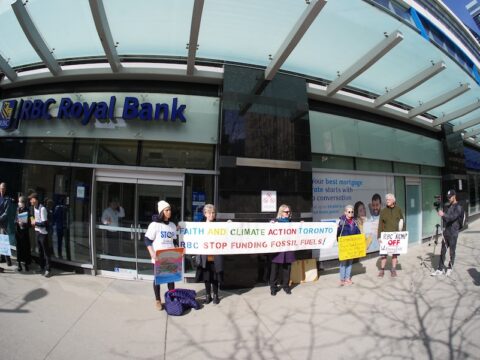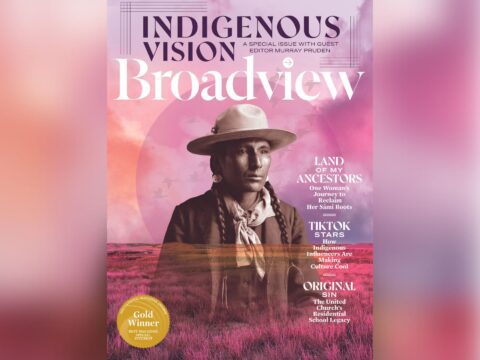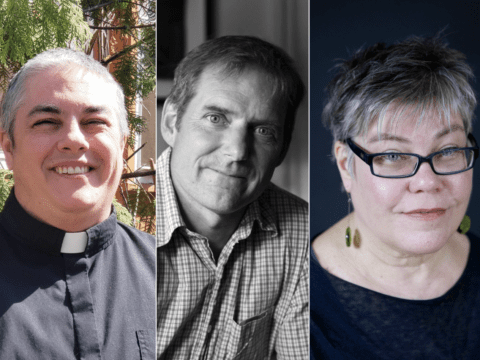At this summer’s General Council meeting in Ottawa, Mardi Tindal completes her term as United Church moderator. She met with her former Spirit Connection co-host, Ken Gallinger, to reflect on the past three years.
KEN GALLINGER: We’ve been friends a long time, and we’ve always seen the church differently. You usually view the church through rose-coloured glasses; my glasses are darker and smokier. What am I missing?
You may unsubscribe from any of our newsletters at any time.
MARDI TINDAL: I want us to celebrate that we care enough to talk about this without being afraid — that’s the only way the church will find a hopeful future. Years ago a former moderator told me, “You’re delving into idolatry, the way you talk about the United Church” . . . because I love this community of faith. I tend to see it at its best. Some of our congregations are now so small, but they are so spirited, engaging in different ways.
KG: You say, “A lot of our churches are now so small” — so there may be excitement, but there’s also grieving about all they’ve lost. Where are we in the grief process?
MT: We have shifted. Early in my triennium, people were saying, “We can’t just keep trimming. We have to change radically.” We can’t pretend there’s a formula that will rescue the institution. And we can’t go back to the way things were. So we are no longer in denial. And we’ve begun experimenting, taking risks; we’ve created the Edge network, begun investing in new ways.
KG: So where are the cutting edges?
MT: Mostly in the risk of telling the truth about what’s happening in our world. At our best, we create safe places where people come together to speak the truth, to talk about soul stories, stories that run beneath the surface of what we see in the media. There’s a huge movement just below the surface, made up of people passionate about social justice; we’re starting to see eruptions of that in places like the Occupy movement.
KG: Some people who are disappointed with the United Church say that, despite a history of truth-speaking on justice issues, that’s not coming through these days. We get involved in long debates about procedure and process, and by the time it’s done, all the point is worn off whatever we’ve tried to say. Is that fair?
MT: We are in a different media reality. Fewer and fewer journalists know about us. I’ve never said no to a media interview, but they get picked up more in local and regional areas. We don’t have a national profile any more. We do, however, have new opportunities with social media. But policy statements, by themselves, don’t have a robust base without lively debate on the ground. I’ve been on Parliament Hill; I’ve met with political leaders. But we need to work more from the ground up, to engage person by person.
KG: You chose “ecological healing” as your theme. Would you do that again?
MT: Yes. It’s our greatest spiritual and moral challenge. In 1977, the United Church said that we would adopt care of the Earth as our organizing goal and principle.
KG: Are you gaining any traction?
MT: Whenever you meet resistance, there’s traction. The resistance to critique of the Northern Gateway pipeline [in British Columbia] is a sign we’re being heard. Church people are very engaged in that critique.
KG: What does the church have to say about that issue that’s different from other concerned groups?
MT: Our reasons for being concerned are different. I look at the authority of scripture. Jesus tells us to love one another, and we can’t love one another unless we also love the garden in which we all live. So for us, it’s about faithfulness. I’ve had climate scientists say, “We are counting on you, as people of faith. Reason and logic have not produced the necessary change.” Change really happens from the heart. We begin with awe and wonder. We bring deep-rooted compassion for this world God loves.
KG: Let’s talk about leadership. Twenty years ago, my friend Doug Ross ran for moderator, and his theme was leadership. I remember him saying, “If we don’t address the issue in our church, we’ll pay for it in 20 years.” Well — are we paying for it?
MT: Yes. Leadership development has always been dear to my heart. At Five Oaks [a United Church education centre near Paris, Ont.], I was tapping young adults on the shoulder all the time, but here’s one of the things I heard them say: “All the United Church ministers I know don’t look very happy.” And so I’ve tried to encourage those in ministry. In the retreats I’ll continue to offer after my term, I try to help ministers connect with their deep passion for why they went into ministry in the first place.
KG: Why are our ministers so unhappy?
MT: Well [deep sigh] . . . ministers say that Presbytery isn’t the kind of place they are looking for. Okay, now you’re laughing at me!
KG: Well, yes, in fact I am.
MT: Ministers say it’s often a competitive place —
KG: I find it a dangerous place.
MT: Yes — and a dangerous place. And ministers need safe places to rediscover what they’re called to be about. For me, that’s at the root of leadership. It used to be that in leadership development, we focused on tips and techniques. “Here’s what to do and how to do it.” But our understanding has shifted. Leadership is now more about who you are. It’s about character. So people like you and me need to pay attention to who we are, as much as what we do. That is a profoundly spiritual practice. We need to pay attention to our inner life, lest we cast more shadow than light.
KG: When you and I were young, the church was steered by great leaders with strong personalities: Bruce McLeod, Bob McClure, Lois Wilson and the rest. Do we have those kind of leaders today?
MT: The people you’ve named were very clear about who they were and what they were called to do. We still have those kinds of leaders in the church. But back then we were a different church. Leadership was top-down. People looked to leaders for “the truth.” As for me, I want to encourage local and regional leadership in the church. Local leadership matters. Profoundly.
KG: Where are the theological fault lines in the United Church today? Where are the plates rubbing together?
MT: I resist that question. We’re all in this together. But I suppose the fault lines are around orthopraxy versus orthodoxy; some folks say, “What we do is more important than what we believe.” Others are on the other side. But most of us know we need one another. We are largely defined as a justice-seeking church . . . and we will run out of steam in our justice-seeking if we become disconnected from our spiritual lives.
KG: How has being moderator of the United Church changed you?
MT: If you can imagine this, I’m even more grateful for The United Church of Canada than three years ago. I see extraordinary commitment and faith in this church. So I feel humbled by this church, and very, very grateful.
***
This story first appeared in The United Church Observer’s July/August 2012 issue with the title “Change happens from the heart. We begin with awe and wonder.”













